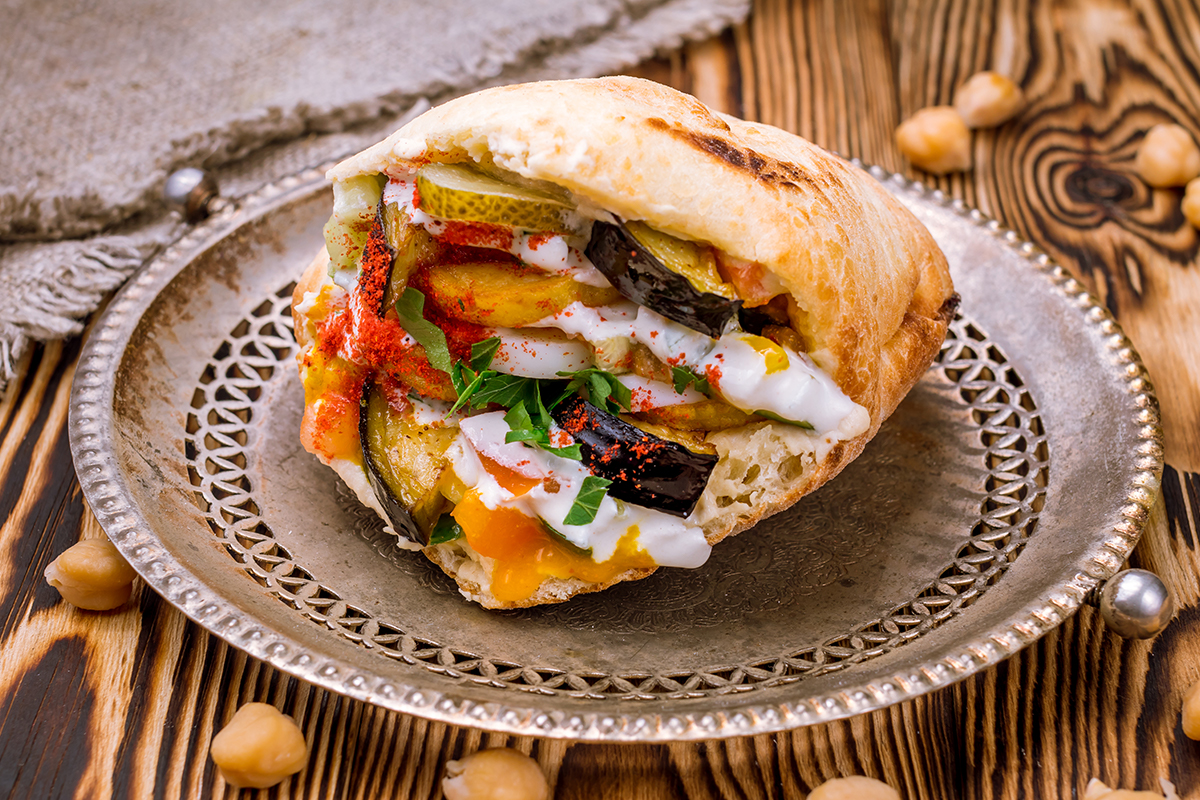Ever since I can remember, my Iraqi-Israeli family has gathered on Saturday mornings to eat sabich. While the idea of eating the same meal once a week for virtually my entire life might sound crazy to most, those who’ve tasted the Middle Eastern sandwich know it’s irresistible. To me, the fusion of flavors from the hard-boiled brown eggs, bitter eggplant, citrus-splashed Israeli salad, and zingy amba all packed into a warm pita never gets old. More importantly, it nourishes and reminds me of where I come from, who I am — and where I belong.
I can still smell the memories.
As soon as my parents parked their forest green ‘90s minivan on the side of the street, it was a race between my siblings and me to see who could slide their door fastest and bolt out of the car. Running up the grassy green hill in San Diego, we charged to the finish line of Saba and Safta’s house. The scent of homemade burekas baking in the oven led us straight to the open door, where my grandparents waited for our arrival.
Embraced with arms wide open, we squirmed as the anticipation of taking a bite of the freshly baked burekas could wait no longer. Our little hands reached out at the kitchen table for the crunchy dough pockets filled with warm feta cheese and spinach, or sometimes potato, and shoved them into our mouths. Crumbs of sesame seeds and za’atar inevitably sprinkled like confetti down our shirts with each bite.
Our aunts and uncles soon arrived after us, and as I got older and our family grew, little cousins came along in tow for the main event. Our tribe of almost 20 people gathered outside in the intimate backyard, walking around a table lined with hatzilim (eggplant); beitzim choomim (brown eggs); salat (Israeli salad); hummus; and last, but most importantly amba, the sour and savory flavor bomb made of fermented mangos that to this day I can’t live without. We stuffed our pitas to the brim, indulging in the Iraqi Jewish classic. After, we hung around for hours enjoying each other’s company and the warmth of the sun. Saturday sabich became our family ritual thanks to the cultural traditions Saba and Safta carried along with them from Iraq.
Born in Baghdad, my grandparents lived colorful lives in their home until the environment turned hostile towards its Jewish population. After the State of Israel declared its independence in 1948, antisemitic violence escalated in Iraq, resulting in the prosecution and harassment of Jewish people. Stripped of their rights and opportunities, Jewish businesses were boycotted and Jews were no longer allowed to hold key jobs. Eventually, Saba left for Israel. Soon after, in 1952, once the Iraqi government permitted a mass exodus, Safta followed with the one suitcase she was allowed to carry with her, leaving everything else they owned behind.
They were able to build a new life in Israel, settling into the Ramat Gan neighborhood where my dad was born and raised. It was an area where the beloved cultural traditions of Iraqi Jews could be restored and revived, blossoming into a vibrant community. Customs included gathering for sabich and cooking tbeet (or chashwa as my family calls it): a rice dish stuffed with chicken that is typically prepared overnight for Shabbat. Hoping for better opportunities, Saba and Safta eventually immigrated to the U.S.
Growing up, I was lucky to have them close by for frequent chashwa lunch visits and drop-ins for tea paired with ba’ba ‘btamur — a sweet and savory biscuit filled with gooey dates.
While Saba and Safta’s small yard on a grassy hill was no synagogue, it’s the closest to my Judaism I’ve ever felt. So, when I found out they were moving out, I was devastated. That house held so many of our family’s memories. Would we be able to keep the magic of what we had built there?
Yes, we could — and we did.
Sabich, like me, has evolved over time. In recent years, we’ve gathered at my aunt and uncle’s house on Sunday afternoons, welcoming an addition of friends and new partners excited to share in our special community ritual. While over the years we have faced ebbs and flows of celebrations, like b’nei mitzvahs and immense grief of losing our dear Saba, the essence of the gift of gathering around this meal carries us forward.
On a recent Sunday, after months of physical isolation from my extended family, the aching for sabich was too hard to ignore, so I set out to make it myself. Taking on making Safta’s special bureka recipe was nerve-wracking. Would I be able to do it just like her? But throughout the process of making the dough, rolling it out, smoothing over a lather of butter, repeating the pattern of folding each piece like a letter to create those flaky layers, I couldn’t help but feel hopeful and filled with pride.
As the shapes started forming into pillowy squares, I dusted them with za’atar and sesame seeds knowing they would come out golden. I continued by boiling the eggs, slicing up an eggplant, chopping up cucumbers and tomatoes to swim in a bath of lemon juice, zipping up spicy zhug, setting out my prized jar of liquid-gold amba, and finally, heating up fluffy pita bread.
After taking those first bites, I felt an energy run through my whole body, propelling me to do a happy dance in my kitchen to Eyal Golan’s Mizrahi classic, “Yafa Sheli.” It was a beautiful and empowering moment. Listening to my boyfriend (who is not Jewish but does happen to be a mensch) talk about the meal we just enjoyed — casually referencing za’atar and amba as if they have been words in his vocabulary all his life — made my heart swell. I locked eyes with my sister who smiled back at me, acknowledging how special it is to feel seen through this unique connection to who I am. I’m excited to keep exploring Jewish traditions with him, and eager to see how we will incorporate these cherished rituals into our own family one day.
Connecting to my Jewish identity has always been through food. It’s at the heart of my family table. Now, I have taken these beloved recipes that have shaped me into my own hands, in my own kitchen. Whether it’s making sabich, Ashkenazi pierogis, or Moroccan fish, I hope you find inspiration to explore your connection one bite at a time.



